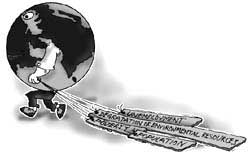Developing issues
 the growing livelihood insecurity that the masses face due to depletion and degradation of environmental resources, population explosion, unemployment and poverty have marked the end of the 20th century. The development sector involved in contesting these issues at the local level has raised more questions than answers. The sector finds it difficult to set an agenda while understanding the global processes of change and its implications at the grassroots level. The changing global scenario demands the eradication of poverty and elimination of exploitation.
the growing livelihood insecurity that the masses face due to depletion and degradation of environmental resources, population explosion, unemployment and poverty have marked the end of the 20th century. The development sector involved in contesting these issues at the local level has raised more questions than answers. The sector finds it difficult to set an agenda while understanding the global processes of change and its implications at the grassroots level. The changing global scenario demands the eradication of poverty and elimination of exploitation.
The articles in the book are reprinted editorials of the newsletter Vichar published in Gujarati and Hindi by unnati a non-governmental organisation ( ngo ) engaged in providing educational support to community-based organisations for a decade in western India. The newsletter aims at providing macro developmental perspectives to the practitioners working at the grassroots.
The book is divided into two sections. The first section includes two of Deepa Sonpal's articles. In the first one entitled Agenda for development in the 21st century: Strategies for grassroot action, she talks about setting up an agenda for the next millennium through grassroots action. This is in the context of various un charters on environmental concerns, population growth, social development and world conference on women. In the wake of the stark disparities between the so-called First and Third world countries, setting up an agenda for grassroots-level action seems to be difficult. This coupled with more than one billion people in the south living below the poverty line, suffering from unemployment, illiteracy and high rate of mortality and morbidity, makes the task much more difficult. Sonpal advocates that the ngo s involved in implementation of development projects should come out of their area-specific cocoons and network for combining efforts.
In her next article, Role of Civil Society in Contemporary Scenario , Sonpal explains the influence of the state-led model of development wherein the state has assumed the responsibility of the social security of citizens. However, the role of the state in the context of rapid globalisation has been questioned by practitioners. The need to strengthen civil society institutions so as to maintain a balance between the state, market and the rights of marginalised groups seems to be an important task. The agenda is to support civil society movements at the organisational, sectoral and societal level. Sonpal argues that the ngo s, an important section of the civil society, have to interact to clarify the commonality of purpose so that they can intervene with available resources, maximum inputs and achieve the expected outcomes.
Other articles in the same section are Role of cbo s in the process of social change by Binoy Acharya, Microplanning: concept & experiences by Sujeet Sarkar and Strategies for Women's Empowerment by pradhan.
The second section contains six articles which form the view from the ground by practitioners. These views destroy many myths related to the politics of development. The third article Is microcredit the answer to poverty eradication by Vinay Mahajan brings out many limitations of well accomplished concept of micro credit. The article belies many popular assumptions that the poorest wish to be self-employed, credit is the main financial service needed by the poor, credit can automatically translate into successful micro enterprises and micro credit institutions can all become self sustaining. Mahajan suggests financial and technical assistance for agro and farm enterprises for generating wage employment for the poor.
The sixth article deals with the concept of Social Clause . It is written by Alice Morris. Her article highlights the concept as the most debated one which is a means to enforce improvements in the working conditions and to raise the standards of workers in export oriented industries. This definition of the social clause ( sc ) as defined by multilateral trade institutions is being objected to by ngo s and trade unions as a protectionist measure to dominate the developing countries. They oppose the idea of labour standards linked to trade agreements in the wake of globalisation which will give comparative advantage to the industries of the North. However, in case of India where large scale of employment is in the informal sector, the concerns are pertinent.
The articles of the book are entwined into a framework for a larger debate, which is appreciable. The book also carries beautiful and attractive illustrations which are entertaining and hold the interest of the reader. It is recommended to the ngo workers, government officials working at the grassroots level, policy makers and development professionals. Overall the book makes interesting reading.
Related Content
- Judgment of the Supreme Court regarding status of Zudpi lands in Maharashtra, 22/05/2025
- Order of the National Green Tribunal regarding cutting of trees without permission for constructing a dumping yard in village Pirthla, Palwal district, Haryana, 14/05/2025
- Judgment of the Supreme Court regarding district survey report for environmental clearance, 08/05/2025
- Order of the National Green Tribunal regarding illegal felling of trees by a real estate company in Delhi, 05/05/2025
- Reply affidavit on behalf of Uttar Pradesh Pollution Control Board regarding steps taken to remove encroachment on ponds in Meerut, Uttar Pradesh, 02/05/2025
- Reply filed by the state of Odisha regarding increasing instances of high energy swell waves, May 1, 2025
